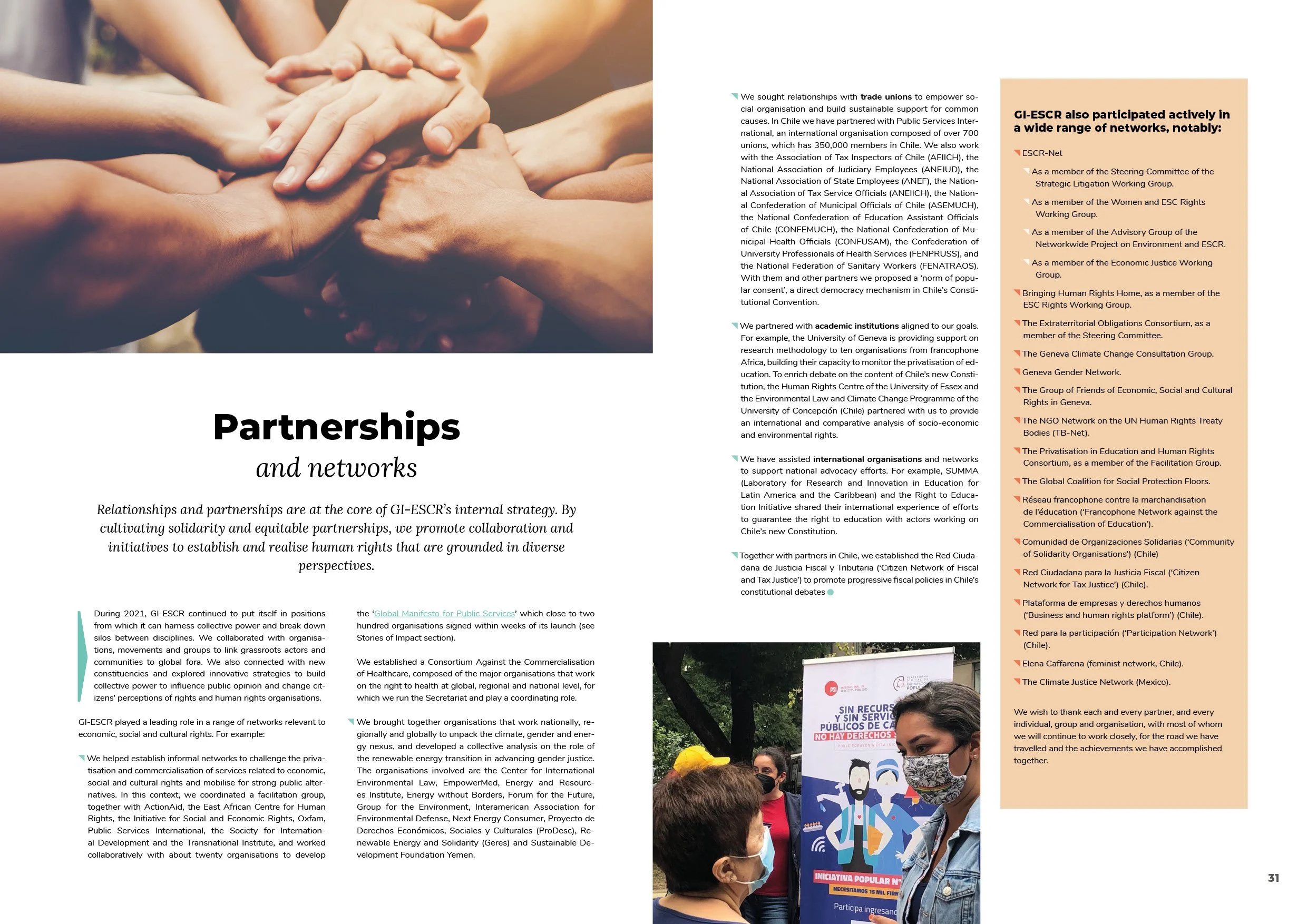partnerships and networks
Relationships and partnerships are at the core of GI-ESCR’s internal strategy. By cultivating solidarity and equitable partnerships, we promote collaboration and initiatives to establish and realise human rights that are grounded in diverse perspectives.
During 2021, GI-ESCR continued to put itself in positions from which it can harness collective power and break down silos between disciplines. We collaborated with organisations, movements and groups to link grassroots actors and communities to global fora. We also connected with new constituencies and explored innovative strategies to build collective power to influence public opinion and change citizens’ perceptions of rights and human rights organisations.
GI-ESCR played a leading role in a range of networks relevant to economic, social and cultural rights. For example: We helped establish informal networks to challenge the privatisation and commercialisation of services related to economic, social and cultural rights and mobilise for strong public alternatives. In this context, we coordinated a facilitation group, together with ActionAid, the East African Centre for Human Rights, the Initiative for Social and Economic Rights, Oxfam, Public Services International, the Society for International Development and the Transnational Institute, and worked collaboratively with about twenty organisations to develop the ‘Global Manifesto for Public Services’ which close to two hundred organisations signed within weeks of its launch (see Stories of Impact section).
We established a Consortium Against the Commercialisation of Healthcare, composed of the major organisations that work on the right to health at global, regional and national level, for which we run the Secretariat and play a coordinating role.
We brought together organisations that work nationally, regionally and globally to unpack the climate, gender and energy nexus, and developed a collective analysis on the role of the renewable energy transition in advancing gender justice. The organisations involved are the Center for International Environmental Law, EmpowerMed, Energy and Resources Institute, Energy without Borders, Forum for the Future, Group for the Environment, Interamerican Association for Environmental Defense, Next Energy Consumer, Proyecto de Derechos Económicos, Sociales y Culturales (ProDesc), Renewable Energy and Solidarity (Geres) and Sustainable Development Foundation Yemen.
We sought relationships with trade unions to empower social organisation and build sustainable support for common causes. In Chile we have partnered with Public Services International, an international organisation composed of over 700 unions, which has 350,000 members in Chile. We also work with the Association of Tax Inspectors of Chile (AFIICH), the National Association of Judiciary Employees (ANEJUD), the National Association of State Employees (ANEF), the National Association of Tax Service Officials (ANEIICH), the National Confederation of Municipal Officials of Chile (ASEMUCH), the National Confederation of Education Assistant Officials of Chile (CONFEMUCH), the National Confederation of Municipal Health Officials (CONFUSAM), the Confederation of University Professionals of Health Services (FENPRUSS), and the National Federation of Sanitary Workers (FENATRAOS). With them and other partners we proposed a ‘norm of popular consent’, a direct democracy mechanism in Chile’s Constitutional Convention.
We partnered with academic institutions aligned to our goals. For example, the University of Geneva is providing support on research methodology to ten organisations from francophone Africa, building their capacity to monitor the privatisation of education. To enrich debate on the content of Chile’s new Constitution, the Human Rights Centre of the University of Essex and the Environmental Law and Climate Change Programme of the University of Concepción (Chile) partnered with us to provide an international and comparative analysis of socio-economic and environmental rights.
We have assisted international organisations and networks to support national advocacy efforts. For example, SUMMA (Laboratory for Research and Innovation in Education for Latin America and the Caribbean) and the Right to Education Initiative shared their international experience of efforts to guarantee the right to education with actors working on Chile’s new Constitution.
Together with partners in Chile, we established the Red Ciudadana de Justicia Fiscal y Tributaria (‘Citizen Network of Fiscal and Tax Justice’) to promote progressive fiscal policies in Chile’s constitutional debates
GI-ESCR also participated actively in a wide range of networks, notably:
ESCR-Net As a member of the Steering Committee of the Strategic Litigation Working Group.
As a member of the Women and ESC Rights Working Group.
As a member of the Advisory Group of the Networkwide Project on Environment and ESCR.
As a member of the Economic Justice Working Group. Bringing Human Rights Home, as a member of the ESC Rights Working Group.
The Extraterritorial Obligations Consortium, as a member of the Steering Committee.
The Geneva Climate Change Consultation Group. Geneva Gender Network.
The Group of Friends of Economic, Social and Cultural Rights in Geneva.
The NGO Network on the UN Human Rights Treaty Bodies (TB-Net).
The Privatisation in Education and Human Rights Consortium, as a member of the Facilitation Group.
The Global Coalition for Social Protection Floors.
Réseau francophone contre la marchandisation de l’éducation (‘Francophone Network against the Commercialisation of Education’).
Comunidad de Organizaciones Solidarias (‘Community of Solidarity Organisations’) (Chile)
Red Ciudadana para la Justicia Fiscal (‘Citizen Network for Tax Justice’) (Chile). Plataforma de empresas y derechos humanos (‘Business and human rights platform’) (Chile).
Red para la participación (‘Participation Network’) (Chile).
Elena Caffarena (feminist network, Chile).
The Climate Justice Network (Mexico).
“We wish to thank each and every partner, and every individual, group and organisation, with most of whom we will continue to work closely, for the road we have travelled and the achievements we have accomplished together.”

